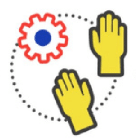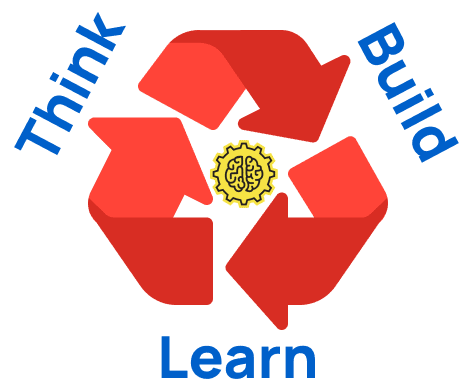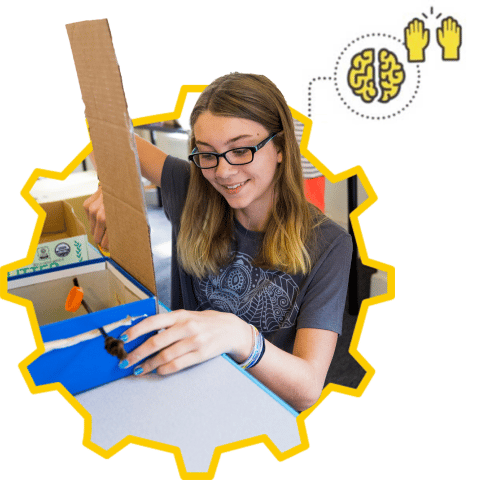Why it Works
How Building With Trash Leads to a Growth Mindset

Open-ended challenges and repurposing recycling lead children through a process of struggle, failure, and success.

Simple frameworks and strategies help children get back to building after they get stuck or overwhelmed — and teach them to push themselves to keep improving past initial success.

With enough practice, this new approach to both struggle and success becomes habit. This habit over time fortifies a Growth Mindset, and unlocking a child’s full potential.

At Neuron Garage, children learn and have opportunities to practice our growth mindset method: Think – Build – Learn.
Guided games, group discussions, and individual coaching throughout the week reinforce this process, helping children understand where they are in it — along with their emotional state — and how to move forward.

Think
Make a Plan. Tap Your Creativity. Find Inspiration.
The weekly challenges have clear objectives, but no instructions or set solutions, so the possibilities are limitless – as are the opportunities for struggle, failure and the need to seek out inspiration and feedback from peers. Building with simple tools and recycled materials requires creativity and perseverance. By using their hands, instead of manipulating within a digital world, campers engage more of their brains, resulting in greater growth.

Build
Get Started. Keep Going. Manage Your Mental State.
At Neuron Garage, we stay focused on one main building challenge for an entire week, requiring campers to iterate on their ideas as they face setbacks and successes. Children are so often moved quickly from one activity to another and they miss out on the opportunity to persevere and develop resilience. However, when they have an entire week for one challenge, campers can really engage in the Think > Build > Learn process that they will be able to apply in almost any situation.

Learn
Challenge Your Thinking. Get Feedback. Find the Lessons in Failure and Success.
Campers engage in discussions and activities throughout the week designed to shift their perspective on mistakes and struggle, coming to see these as opportunities for growth. They develop grit and resilience as they experience the results of hard work and iteration. Through thoughtful questions, campers explore their attitudes on success and failure, and shift their mindset to embrace both failure and success as information and not endpoints.

Why is a Growth Mindset so Important?
We want your child to believe that their talents and abilities can be developed through good strategies, hard work, and feedback. A growth mindset leads to a life-long love of learning and a resilient attitude that sees struggle and mistakes as opportunities for growth. People with a growth mindset take on bigger challenges in life and stick with those challenges longer, which unlocks their full potential.




